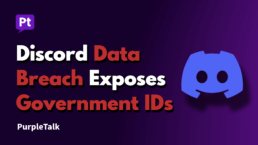Discord Data Breach Exposes Government IDs
A recent security breach at Discord has raised serious concerns about the safety of personal data, particularly information used for age verification. The incident, which saw a third-party customer service provider targeted by hackers, resulted in the exposure of sensitive user information, including government-issued identification. This event underscores the significant risks associated with collecting and storing such personal details, a practice that has become increasingly common with the rise of age verification laws around the globe.
The Discord Hack: What Happened?
In a confirmed cyberattack, an unauthorized party gained access to user data from one of Discord’s third-party customer support services. The attackers reportedly sought a financial ransom from the company. The compromised data varied depending on what users had shared with customer support, but it could include names, Discord usernames, email addresses, billing information, IP addresses, and even direct messages with support agents. Most alarmingly, images of government IDs were also accessed. This occurred because users who had previously appealed an age determination had shared their IDs with the support service. Discord has assured the public that passwords, full credit card information, and on-platform messages were not affected.
In response to the breach, Discord immediately cut off the third-party provider’s access, launched an internal investigation, and notified law enforcement and relevant authorities. The company has since reviewed its security protocols for all third-party vendors. Affected users will be notified via email from [email protected], and those whose ID images were compromised will be specifically informed. Discord advises all impacted users to be vigilant for any suspicious communications.
The Broader Implications for Age Verification
This incident serves as a stark warning about the potential dangers of age verification laws, which often require individuals to submit sensitive personal information to access certain online content. While the IDs in this case were not stolen directly from an age-check provider, the breach highlights the vulnerability of sharing such data with any third party. Cybersecurity experts have long warned that requiring government IDs for online access is a “disaster waiting to happen,” as these platforms become prime targets for cybercriminals.
Critics argue that while the goal of protecting minors from harmful content is commendable, the methods being used may be creating a greater security risk. The reliance on collecting personal data, such as government IDs, puts users at significant risk of identity theft and other cybercrimes. Privacy advocates suggest that more secure, privacy-focused alternatives exist. For example, parental control tools and device-level restrictions could be a more effective way to manage children’s internet access without requiring the submission of sensitive personal information. These tools allow parents to block content, limit app downloads, and enforce age ratings directly on their children’s devices.
The Pushback: VPNs and New Legislation
The debate over age verification has fueled a significant increase in the use of Virtual Private Networks (VPNs) as a way to bypass these new laws. Following the introduction of the Online Safety Act in the UK in July 2025, VPN usage saw a considerable spike. This trend has since spread to the United States, where 24 states have already implemented age verification laws, with more on the way.
In states like Ohio and Arizona, where new laws recently went into effect, Google search interest for VPNs has surged. The ongoing conflict between online safety and data privacy is leading to new legislative proposals. For instance, lawmakers in Michigan have proposed a total ban on VPNs, arguing it would help prevent the viewing of harmful content. As more states, like Missouri, prepare to implement their own age verification laws, the battle between protecting data and protecting children online is set to intensify. The Discord breach has added a powerful new argument to the critics of these laws, emphasizing that the very solutions meant to safeguard children might be putting everyone’s personal information at risk.
